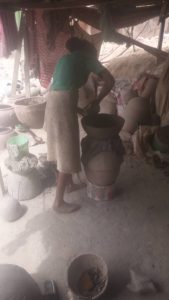Ilorin Pottery: Age-long traditional craft on brink of extinction




By Sulyman Jimoh
Historical snippets
Over the years, needless to say from time immemorial in the ancient city of Ilorin, pot making has been reckoned as an iconic symbol of the town itself.
The ceramist craft which has been around for more than a lifetime has been a hallmark or a core element of the Ilorin identity, a crown jewel of the city’s cultural exports that symbolises the vast diversification potentials of the once ancient city of tradition and religion.
Modernisation threat
But unfortunately, the story of the Ilorin heathen pot, a jewel that promised so much has endured a torrid time and still struggling to survive from the passing hands of time and modernity.
The fate and present state of the once popular traditional trade has resonated series of questions in the mind as to what the future holds for the craft itself in an age that traditional concepts and art are struggling with modernity and technological breakthroughs for survival in a battle that is only a matter of time. Moreover, what has been the lot of those that has continued to hold the fort for the continued existence of the age long artistry?
Finding lost jewel
To unravel the aforementioned puzzle and find the lost “Jewel”, this writer visited Dada Community, Okelele in Ilorin East Local Government, the headquarters of the craft in Kwara State. On getting there, further inquiry led to his direction to the inner part of the neighborhood called “Ebu Dada”, where he came face to face with some of the most hardworking yet innovative women Kwara can really be proud of doing what they know how to do best by molding different shapes and designs of the age-long craft. It was indeed a fascinating artistic haven.
Veteran to the rescue
Further inquiry to find out more about the enthralling story of the craft led to meeting the leader of the pottery, an aged woman, graceful and soft spoken who should be counting her years as a septuagenarian, Alhaja Raliat Saka. She was a highly respected and revered personality among the workers. Saka not only went down memory lane on the challenges and survival struggles of the craft, her exposition was a fitting climax to the sad narrative about the nostalgic but gradually disappearing craft that has trailed the trade over the years despite its enormous potentials to make Ilorin the Nigeria version of Jiangxi city in China famous for the art in the world.
According to her, she is the 6th generation of potters that has worked in the ‘factory’ over the years.
It was gathered that the woman that started the pottery is called “Yeyenibi” and her granddaughter who redefined the artistic prowess of the pottery (“Èbúú”) as it is locally called, is Asmau Ilé Ókò, who is an ancestor of Alhaja Raliat, who is still holding the fort till date.
The Skill is strictly passed down from generation to generation and it is a family business that only involves and inherited by people of the same ancestry. It is seen as a gift and worthy legacy from their progenitors.
Findings by National Pilot revealed that no outsider is allowed to learn or practice the craft, a trend that is not expected to change now or anytime soon even in the age of modernization and globalization of skills. They are willing and determined to stick to their old ways, the ways of their ancestors.
Absence of male potters
During this visit to the pottery capital in Ilorin, one of the interesting things observed was the absence of male potters while walking throughout the premises. Explaining further, Alhaja Raliat disclosed that the trade is strictly restricted to the female of their lineage adding that “Our mother that passed down the craft did not teach any male not even her own sons, talk less of an outsider male”.
She emphasized on the family-restricted nature of the craft, saying “No outsider has ever been allowed to learn it from here. It is mainly we that are of the same family extraction as long you’re a female, even our daughters that are married and granddaughters are learning or practicing it”.
“We can’t say precisely when this tradition started but we say when the city of Ilorin was established”, she added in relation to the historical background in the Ilorin.
Lamentation
Alhaja Saka however lamented the neglect of patronage by the people in Ilorin saying “We (people of Ilorin) that own it don’t value it very much. It is people from other places that cherished our craft more. We enjoy more patronage from people from the south western states like Osun, Oyo, Ondo and the rest, even from Benin City, Onitsha, Warri, they all come here to patronize us, not considering the long distance. But it is quite bemusing with our attitude here often regarding the craft as dirty thing or unhygienic.
“When you drink from our pot, it is healthier than the modern metallic zinc that many reports claim to be harbinger of many ailment, including the dreaded cancer. Our pot is made from nature and when you cook with an heathen pot, you will see that it will maintain it temperature even after a while of taking it from the cooking flame “.
Asked about the business climate of the craft most especially in this modern age, the pottery veteran reiterated that “Just like every other business, we have some good days and a fair share of some not so good days. It is all as God wishes but we are really praying for better days.
During the raining season, we usually run at loss, because rainfall usually ruin the newly heated pot that has just been taken down from the oven after heating. Also excessive rainfall usually doesn’t allow the pots to enjoy enough sun drying”.
But what is the acceptance of the local craft in the international scene, Alhaja Saka narrated a story of about 30 years ago about how an European male researcher from London who was enthralled by their works spent up to a month with them in Ilorin exploring and took back some pictures to his students in London. The pictures however caught the fancy of one of the students, a female researcher. She subsequently embarked on a trip to Ilorin six years ago to confirm what she saw decades ago in the pictures from her lecturer. She was so fascinated by the colourful culture of Ilorin, most especially the pot making and in a bid to identify with the people, she insisted on getting a native name and the people named her “Asake”. She spent up to two weeks in Ilorin.
Alhaja Saka also recalled how the former governor of Kwara state, Dr Bukola Saraki, helped to exhibit their craft to the entire nation at Abuja, where he (Saraki) was honoured for his efforts in promoting culture.
Appeal
She solicited the government support to help promote their work by helping them to modernise it with provision of modern molding machines that will help to improve their products efficiency. According to her, lack of capital has been a major challenge to them in the business and called on the government to create a platform for soft loans for them in order to save their ailing business which contributes a lot to the social political development of the state. “We’re also one of the key exhibitionists at the annual durbar celebration at the palace of Emir of Ilorin, and the Emir revere and hold us in high esteem”.
Also speaking with the Balogun of Dada community, Alhaji Razaq Jimoh said the women at the pottery in the community are playing a very significant role because “They are symbolic to this community and Dada’s first ambassadors. When you think of Dada area, you’ll think of the pot makers”.
The community head however noted the lack of Government assistance as among the challenges facing the women who are engaging in the age long tradition and heritage of Ilorin.
Community cry
Echoing the pleas of the women, Jimoh charged the government to assist them by helping to modernize the craft with provision of modern equipments which will require less stress and reduced smoke emission for the craft not to go into extinction. He lauded the role of the Emir of Ilorin, Alhaji Ibrahim Sulu Gambari for his role in the preservation of the craft. “The Emir of Ilorin has been a father figure and frontliner in the efforts to protect our culture. He usually invites the women to the palace during Durbar ceremony held during Eid festival to come and display their wares and crafts’. This, he noted might be able to put some life back into the craft.
The trip to the pottery has been an eye opener to say the least, and seeing all those pots tells a story of the beautiful city of Ilorin.
Like an old adage suggests, in the lustful eyes of a goat should vast expanse of earth becomes a yam peel, in the sight of our mothers at Dada in Ilorin, the daunting river of Asa should become clay, I meant gold.





